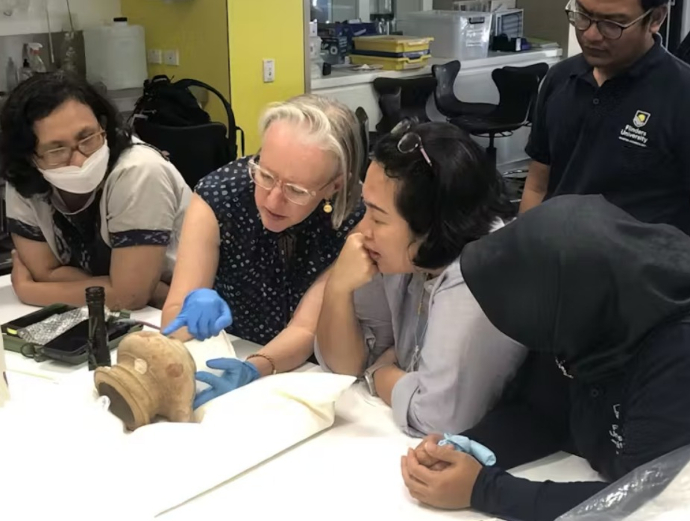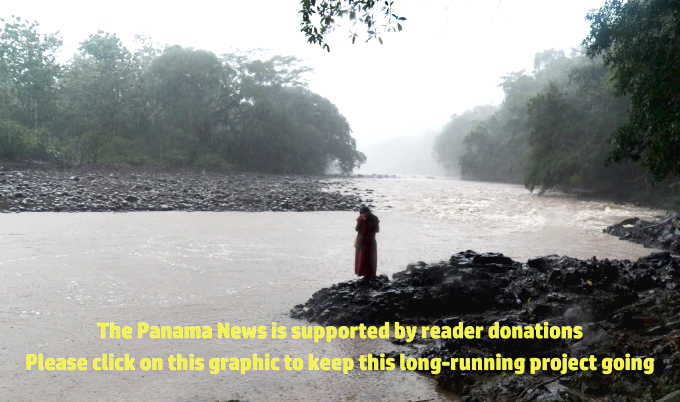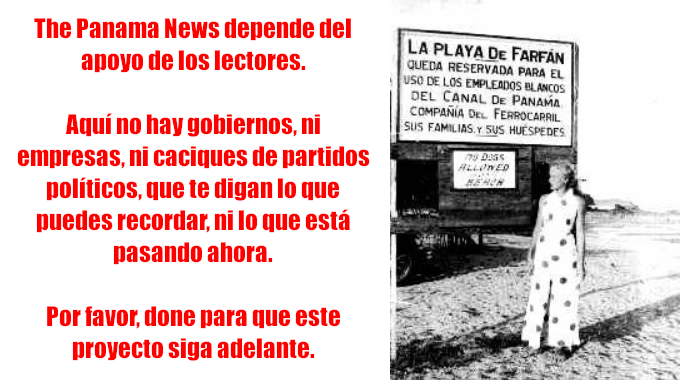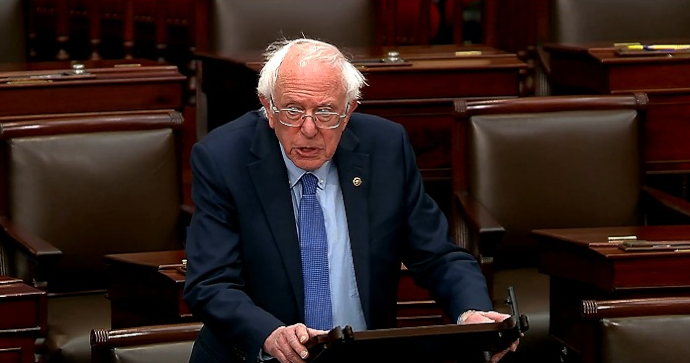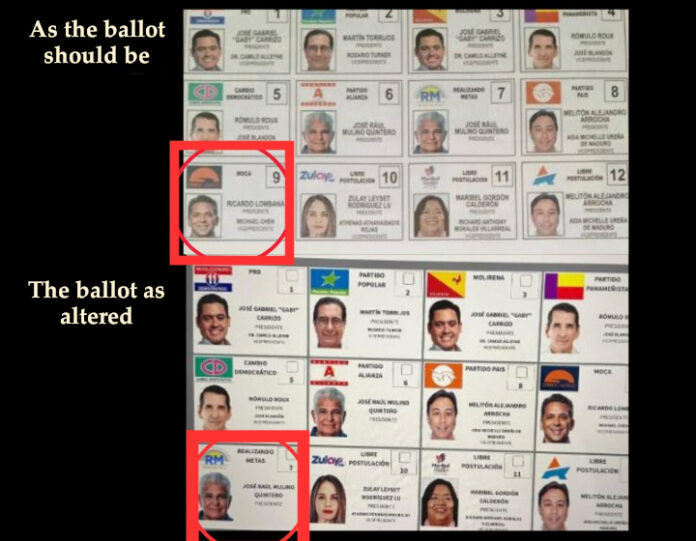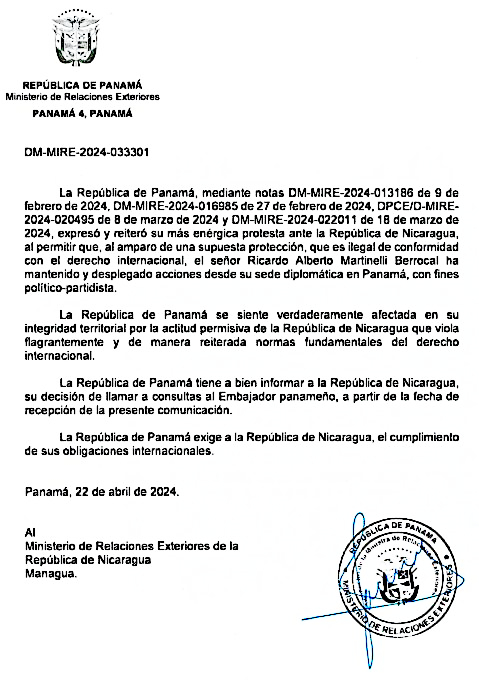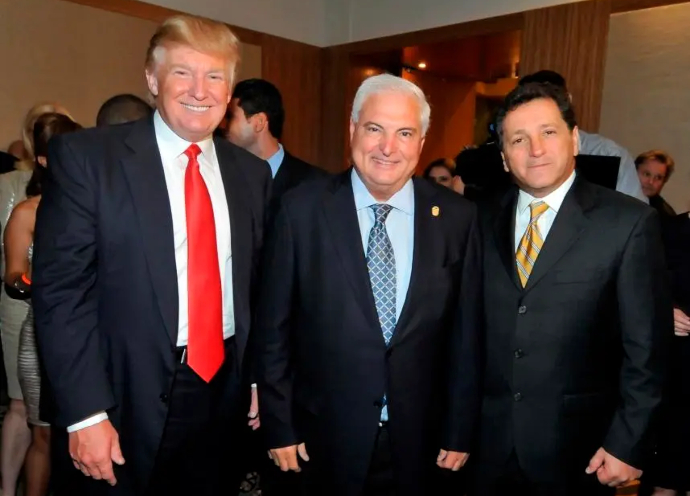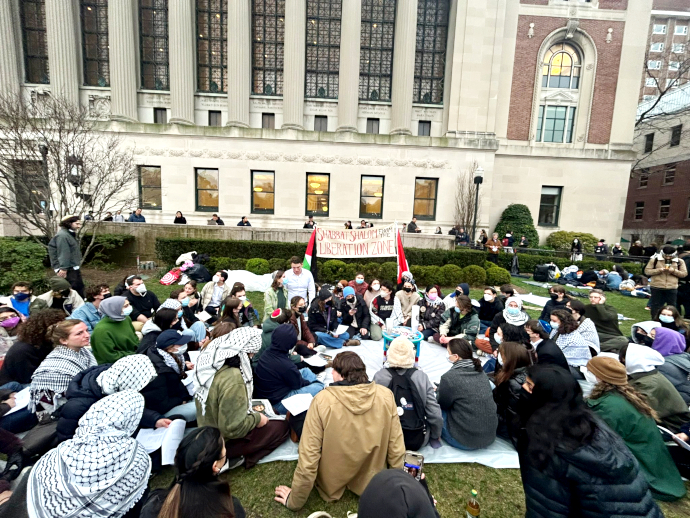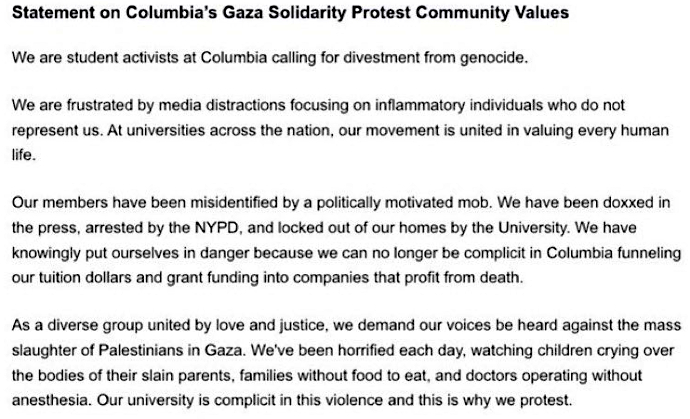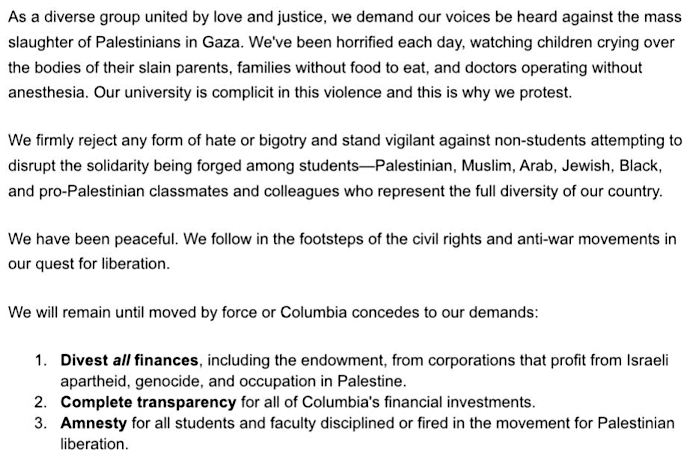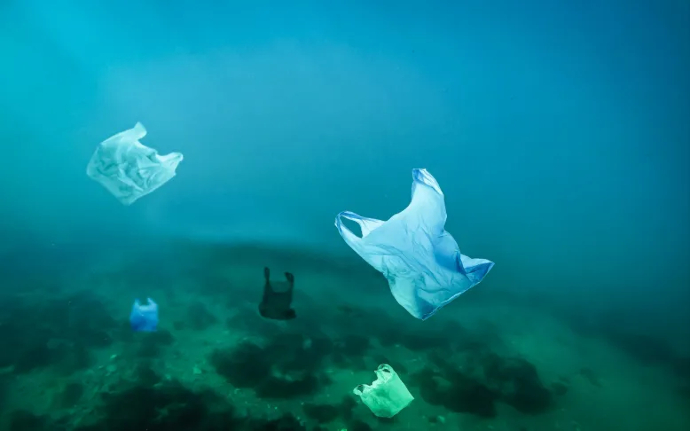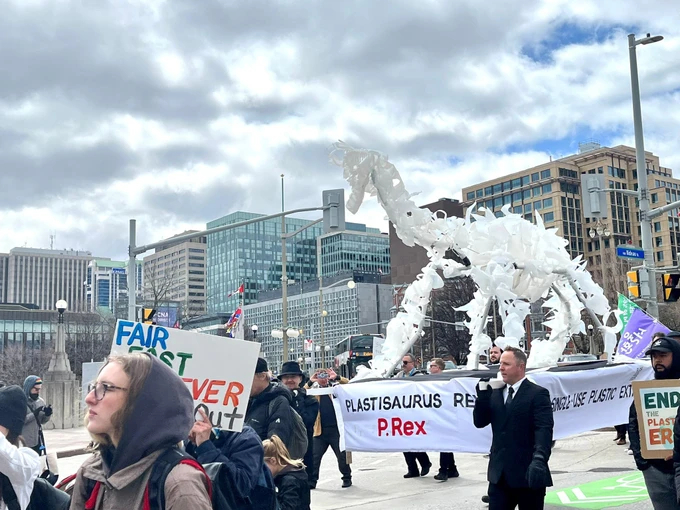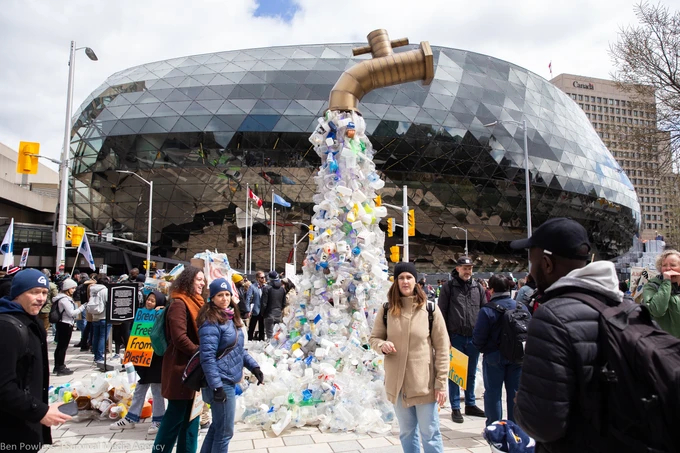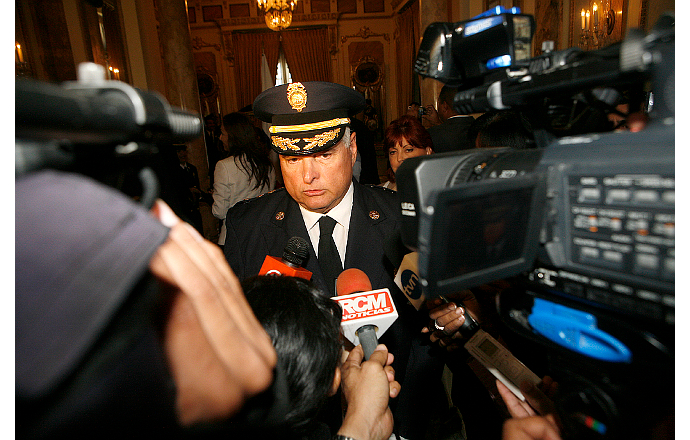Foto por la entonces Presidencia.
Pedreschi, “…de ningún convenio de derechos humanos debe protegerse a quienes se han auto-inflingido….”
HONORABLE MAGISTRADA PRESIDENTA DE LA CORTE SUPREMA DE JUSTICIA:
Yo, CARLOS BOLÍVAR PEDRESCHI, varón, panameño, mayor de edad, casado, abogado en ejercicio, con cédula de identidad personal No.2-33-746, con oficinas en Avenida Federico Boyd y Calle 51, No.20, distrito y provincia de Panamá, corregimiento de Bella Vista, lugar donde recibo notificaciones personales y teléfono 269-4966, por este medio, comparezco, en tiempo oportuno, ante el Pleno de la Corte Suprema de Justicia a efecto de presentar mi ALEGATO en Avenida Federico Boyd y Calle 51, No.20,distrito y provincia de Panamá, corregimiento de Bella Vista, lugar donde recibo notificaciones personales y teléfono 269-4966, por este medio, comparezco, en tiempo oportuno, ante el Pleno de la Corte Suprema de Justicia a efecto de presentar mi ALEGATO en el proceso indicado al margen superior derecho del presente escrito.
En cumplimiento de la decisión adoptada de alegar, transcribo a continuación, para los efectos correspondientes, mi opinión sobre los distintos aspectos constitucionales en los cuales fundamento mi posición en cuanto a la inconstitucionalidad del segundo punto de la parte resolutiva del Acuerdo 11-1 de 4 de marzo del Tribunal Electoral.
I. CANDIDATURAS PRESIDENCIALES SIN VICEPRESIDENTE
A.La competencia privativa de la Corte Suprema de Justicia La opinión sobre el tema enunciado exige el esclarecimiento de dos extremos decisivos. El primero de éstos demanda determinar si la Corte Suprema de Justicia tiene o no competencia para conocer de los actos emanados del Tribunal Electoral que violen normas constitucionales. El segundo extremo demanda precisar si lo decidido por el Tribunal Electoral viola o no alguno de los artículos de la Constitución política del país.En cuanto al primer extremo, como lo he sostenido hace mucho tiempo, no tengo la menor duda de que la Corte Suprema de Justicia sí tiene competencia para conocer y decidir de los actos del Tribunal Electoral violatorios de la Constitución. El problema de la competencia está igualmente claro para la Corte Suprema de Justicia la cual ha venido conociendo, sin dudar de su competencia para hacerlo, de recursos de inconstitucionalidad contra actos del Tribunal Electoral que incluyen. Acuerdos de Sala, como es el caso del Acuerdo 11-1 mencionado. Sobre el punto, la Constitución no ha podido ser más clara. En su artículo 143dice textualmente lo siguiente:
“…Las decisiones en materia electoral del Tribunal Electoral
únicamente son recurribles ante el mismo, y una vez cumplidos los
trámites de Ley, serán definitivas, irrevocables y obligatorias.
Contra estas decisiones solo podrá ser admitido el recurso de
inconstitucionalidad”. (Énfasis suplido)
Sobre el tema manifiesto que nunca he tenido la menor duda de que en Panamá la Corte Suprema de Justicia, en ejercicio del control privativo de la constitucionalidad, puede conocer de los recursos de inconstitucionalidad que se presenten contra actos emanados del Tribunal Electoral que violen la Constitución Política del país. Que recuerde, nadie
en Panamá había dudado de esta competencia y menos la propia Corte.
El tema lo he traído a colación porque, recientemente, algunos abogados han sostenido públicamente que los actos del Tribunal Electoral que violen la Constitución del país no son recurribles ante la Corte Suprema de Justicia, ni ante ninguna otra instancia.
Mi opinión data de hace más de 58 años y así quedó consignada en las páginas 264, 265, 266 y 267 de mi obra titulada el Control de la Constitucionalidad en Panamá, editada en Madrid, España, por ediciones Guadarrama. No obstante la longevidad de esta opinión, la normativa constitucional en la cual descansa no ha variado y tampoco la decisión del
Pleno, en acatamiento de la Constitución, de conocer de todo acto del Tribunal Electoral violatorio de la Constitución.
B. La inconstitucionalidad del segundo punto de la parte resolutiva del Acuerdo 11-1 de 4 de marzo de 2024 que designa candidatura presidencial sin vicepresidente.
Aclarado el primer extremo, corresponde ahora valorar el segundo, esto es, si es constitucional o no lo decidido por el Tribunal Electoral en el caso objeto de este alegato.
Antes de emitir opinión sobre este aspecto conviene dejar constancia de que, en mi concepto, la redacción del artículo 177 es suficientemente clara:
“… Con el Presidente de la República será elegido, de la
misma manera y por igual período, un Vicepresidente…”.
Debo agregar, sobre el problema confrontado; esto es, que la papeleta consigne una fórmula incompleta, el que no tengo la menor duda de que este problema se produjo no por el texto constitucional, sino por la falta de previsión en el Código Electoral y por la falta del Tribunal Electoral al no haber dictaminado un procedimiento legal para que los partidos en
cuestión estableciesen una fórmula presidencial y vicepresidencial completa, tal cual lo indica la Constitución. Hacia futuro, el Código Electoral deberá contemplar en su texto el caso de muerte o inhabilitación del candidato a la presidencia antes de las elecciones, e igualmente, el caso de muerte o inhabilitación del Vicepresidente antes de las elecciones.
Por lo anterior, la decisión del Tribunal Electoral no solo viola uno, sino varios artículos de la Constitución. Estos artículos son el 177, el 181 y el 185.
Más aún, curiosamente el propio Tribunal Electoral en la decisión varias veces citada ha admitido el riesgo de violación a la Constitución, concretamente al artículo 177 de la Carta Magna. Copio, a continuación, los párrafos del Acuerdo 11-1 del Tribunal Electoral que confirman lo dicho:
1. “El vicepresidente tiene atribuciones que ejerce paralelamente
con el presidente de la República, ambos en ejercicio del cargo”;
2. “…la nómina presidencial no puede prescindir de un candidato a
vicepresidente”;
3. “….que se trata de dos cargos a elegir bajo el mismo
procedimiento y la ausencia de uno de los dos haría que la
nómina incompleta generara un incumplimiento al mandato
constitucional del artículo 177.”
4. “Se requiere la elección de un vicepresidente para que ejerza las
funciones que establece el artículo 185 de la Constitución
Política; es decir que la nómina debe estar completa para cumplir
con lo establecido en el artículo 177 de la Constitución”
De mi parte, señalo lo siguiente:
1. Este artículo 177, claramente dispone que con el presidente de la República será elegido un vicepresidente, quien lo reemplazará en sus faltas, y que ambos serán elegidos por sufragio popular
directo por mayoría de votos.
2. Se trata, pues, de que dicho artículo establece una fórmula presidencial que se compone de un presidente y de un
vicepresidente.
3. De su parte, el artículo 181 indica que el presidente y el vicepresidente tomarán posesión de sus respectivos cargos ante la Asamblea Nacional.
4. Como resulta de lo dicho, por disposición constitucional un presidente no puede ser elegido sin un vicepresidente.
Ante el duro y puro texto del artículo 177, confirmado por el artículo 181 y el artículo 185, en mi concepto, la Constitución no autoriza, pudiendo haberlo hecho, candidaturas a la presidencia sin vicepresidente. Se trata, pues, de una suerte de camisa de fuerza que contra lo que se quisiera, no tiene cómo salvar la solución que establece el Acuerdo 11-1 de 4 de marzo del Tribunal Electoral sin violar la Constitución.
No obstante, los claros criterios de inconstitucionalidad analizados por el propio Tribunal Electoral, el mismo encontró justificación para explicar la decisión arbitrada argumentando que de no ser así se dejaría a los partidos Realizando Metas y Alianza sin participación en la elección presidencial indicando que ello implicaría la conculcación del derecho de los mismos y de toda su membresía y que los convenios internacionales de derechos humanos suscritos por Panamá, que hacen parte del bloque de la constitucionalidad, obligan a hacer una “interpretación amplia de la ley para garantizar el ejercicio de todos los derechos que podrían verse afectados de darse una interpretación restrictiva de las normas legales
aplicables al caso”.
En mi concepto, las razones expuestas por el Tribunal Electoral para justificar la decisión adoptada violando los artículos 177, 181 y 185 de la Constitución son insuficientes, aun con fundamento en el bloque de la
constitucionalidad por las siguientes:
1. Los problemas y normas deben analizarse desde su universalidad y no segmentariamente ni a retazos.
2. La universalidad del problema constitucional pasa por el análisis de las situaciones de hecho y de derecho alrededor del mismo.
En ese sentido, tanto el Tribunal Electoral como los partidos políticos afectados por el texto del artículo 177, que conocían
perfectamente que la Constitución prevé una fórmula que se compone de un presidente y un vicepresidente, pudieron haber resuelto el problema ante el hecho sobradamente conocido, nacional e internacionalmente, del fundado riesgo de que el candidato a la presidencia de la República terminara, como en efecto terminó, con una sentencia condenatoria en firme que lo inhabilita para presentarse a las elecciones como candidato presidencial. Esto era completamente conocido por parte, tanto del Tribunal Electoral, como de los partidos afectados.
3. La realidad descrita, en mi concepto, es la que no permite una interpretación que pretenda justificar la violación constitucional a título de no conculcar el derecho de los partidos afectados y de aquellos que, en conocimiento de esta realidad constitucional, decidieron correr el riesgo que el referido acuerdo del Tribunal Electoral propone conculcar.
A lo dicho es oportuno señalar lo siguiente:
1. Los partidos afectados contaban con la seguridad de la contingencia de una condena en firme sobre el expresidente Ricardo Martinelli con lo cual la misma se podía prever.
2. Tan convencidos estaban sus propios abogados de su responsabilidad y consiguiente condena que, desde el año 2017 hasta octubre de 2023, hicieron todo lo posible para que el caso prescribiera, porque justamente, contaban con fundados temores de que si se producía un juicio la condena era altamente previsible, como en efecto ocurrió.
3. En el caso que nos ocupa, la Corte debe abstenerse de consideraciones políticas y basar su decisión en razones estrictamente constitucionales.
Por ejemplo y solo para citar algunos casos, debe abstenerse de consideraciones políticas como las que siguen:
a. Que el candidato eventualmente afectado fue, por cinco años, Ministro de Seguridad del gobierno conocido nacional e internacionalmente como el más corrompido del país.
b. Que el gobierno al que perteneció por cinco años fue una típica cleptocracia donde resultaron condenados y algunos detenidos, el propio expresidente de la república y buena parte de sus ministros de estado, incluyendo al propio candidato presidencial que también conoció cárcel por varios meses.
c. Que el candidato presidencial ha declarado públicamente que ayudará a su padrino político, actualmente condenado y asilado en una embajada, a evitar las consecuencias de esa condena.
Dicho lo anterior, siento que no es necesario el rosario de ejemplos de carácter políticos descartables para los propósitos de una decisión constitucionalmente fundada.
Termino reiterando la exigencia de fallar en estricto Derecho y omitir todas consideraciones políticas; en fallar oportunamente, pues de no hacerlo la Corte caería en la irresponsabilidad de dejarle al país un problema eventualmente peor del que confronta a la fecha.
Afortunadamente para la Corte, la misma cuenta con sobrados fundamentos constitucionales para declarar inconstitucional el punto segundo de la parte resolutiva del Acuerdo 11-1 de 4 de marzo de 2024.
El país está urgido de higiene moral y un fallo de inconstitucionalidad como el que favorezco en este alegato sería una oportuna y práctica contribución de la Corte Suprema de Justicia.
Por el valor jurídico que tiene, reproduzco a continuación, la parte relativa al control de la convencionalidad en función del bloque de la constitucionalidad, que se consigna en el alegato que, a propósito de este mismo caso, presenta la licenciada Nadia Pedreschi de Halman y con el cual coincido:
“EL BLOQUE DE LA CONSTITUCIONALIDAD NO AMPARA LA
SITUACIÓN CONFRONTADA Y MENOS PUEDE CONSTITUIRSE EN
FUNDAMENTO PARA JUSTIFICAR QUE LAS NÓMINAS
PRESIDENCIALES NO TENGAN CANDIDATOS A LA
VICEPRESIDENCIA INFRINGIENDO LO DISPUESTOS POR LOS
ARTÍCULOS 177, 181 Y 185 DE LA CONSTITUCIÓN
PRIMERO: Es un hecho que tanto los partidos políticos sobre cuyo candidato a la presidencia pende un recurso de inconstitucionalidad, como el propio Tribunal Electoral tenían cómo evitar la situación en ciernes.
Los partidos políticos en cuestión podían haber previsto en aquéllas primarias en que escogían a un candidato a la presidencia sobre el cual, en aquel momento, pendía la decisión de un recurso de apelación sobre una sentencia condenatoria, la posibilidad de que la misma fuera confirmada y, por lo tanto, podían haber escogido un candidato a la presidencia distinto al escogido en las elecciones primarias de los mismos; candidato éste que, a su vez, hubiese podido designar un candidato a la vicepresidencia de manera que la fórmula presidencial, además de estar completa, hubiera sido el resultado de la elección democrática en primarias del cargo de presidente a las elecciones presidenciales, como lo establece el Código Electoral.
SEGUNDO: También es un hecho que el Tribunal Electoral conocía la realidad descrita anteriormente y, por tanto, en uso de las facultades que le adscribe el artículo 143 arbitrar una fórmula no inconstitucional, que permitiese la participación de los partidos políticos afectados con una fórmula completa, esto es, la de Presidente y Vicepresidente.
TERCERO: La tesis del Acuerdo 11-1 del Tribunal Electoral para establecer una fórmula presidencial incompleta que es inconstitucional descansa en lo que se conoce como el bloque de la constitucionalidad que ha incorporado al derecho constitucional patrio, convenios internacionales de derechos humanos suscritos por Panamá.
En ese sentido el referido Acuerdo 11-1 indica que dichos convenios internacionales de derechos humanos suscritos por Panamá le obligan a hacer una “interpretación amplia” de la ley para garantizar el ejercicio de todos los derechos que podrían verse afectados ya que de darse una “interpretación restrictiva” se dejaría a los partidos Realizando Metas y Alianza sin participación en la elección presidencial lo que, en opinión del Tribunal Electoral, implica conculcar el derecho de ambos partidos y de toda su membresía, y el derecho de todos los candidatos cuya postulación ya está en firme y que no han tenido nada que ver con los hechos que han producido la inhabilitación del candidato presidencial.
Como se aprecia, en el razonamiento del Tribunal Electoral no ha sido contemplado si, cómo y por qué, la denominada “interpretación amplia” resulta amparada en el bloque de la constitucionalidad, más allá de referirse al resultado que la llamada interpretación restrictiva traería como consecuencia.
CUARTO: Los convenios de derechos humanos suscritos por Panamá, no alcanzan para justificar, la tesis de evitar la conculcación del derecho a ser elegido producida por la propia colectividad política a la cual se le pretende proteger dicho derecho ni de los miembros de estas colectividades a elegir. La razón es simple, al amparo de ningún convenio de derechos humanos debe protegerse a quienes se han auto-inflingido el efecto de quedar sin participación en las elecciones generales habiendo tenido sobradas oportunidades para conjurar este riesgo porque las reglas del juego electoral estaban claramente establecidas a nivel constitucional como también las consecuencias legales de la actuación políticamente arriesgada de ambos colectivos políticos.
QUINTO: El noble y justo propósito de los convenios de derechos humanos suscritos por Panamá y otros estados no acepta una arbitraria interpretación que, a título de proteger el derecho de ser representada de una colectividad política produzca los siguientes efectos:
- Un fuero y privilegio del que no gozarán otras colectividades políticas que respetaron las reglas del juego electoral ya conocidas;
- Conculcar a dicha colectividad política que, conforme al Tribunal Electoral, resulta afectada, el derecho de elegir un vicepresidente; y
- Conculcar el derecho del país a tener un Vicepresidente que cumpla las funciones que expresamente establece la Constitución, en el caso de que la nómina presidencial así concebida por el Tribunal resulte ganadora.
Evidentemente, las convenciones de derechos humanos suscritas por Panamá no tienen el propósito de producir los efectos señalados.
SEXTO: Finalmente, el propio Tribunal Electoral que arbitró el Acuerdo 11-1 cuyo punto segundo es inconstitucional y que conocía que lo era porque así lo evidenció, tenía las herramientas para garantizar una solución legal que, no siendo inconstitucional, permitiese la participación de dichos partidos en la contienda electoral y no lo hizo.”
Panamá, 16 de abril de 2024.
Dr. Carlos Bolívar Pedreschi
Cedula 2-33- 746
Contact us by email at / Contáctanos por correo electrónico a thepanamanews@gmail.com
To fend off hackers, organized trolls and other online vandalism, our website comments feature is switched off. Instead, come to our Facebook page to join in the discussion.
Para defendernos de los piratas informáticos, los trolls organizados y otros actos de vandalismo en línea, la función de comentarios de nuestro sitio web está desactivada. En cambio, ven a nuestra página de Facebook para unirte a la discusión.
~ ~ ~
These announcements are interactive. Click on them for more information.
Estos anuncios son interactivos. Toque en ellos para seguir a las páginas de web.

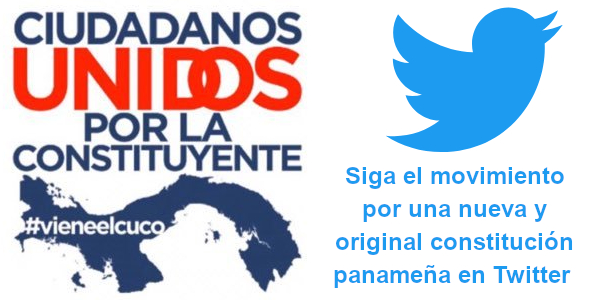
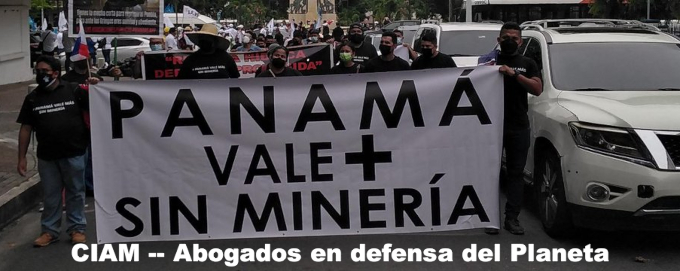

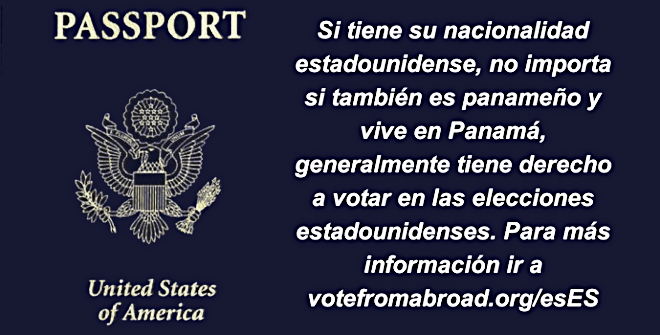
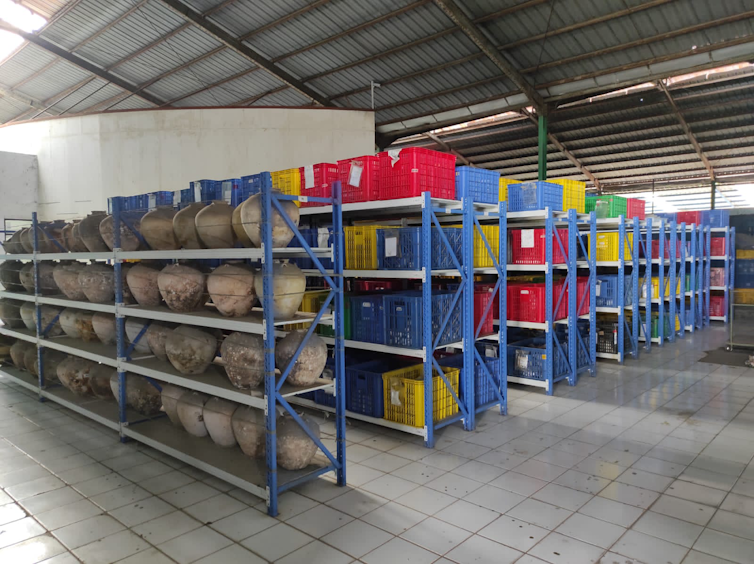 These ceramics are among the ‘orphaned objects’ we are researching.Ministry of Marine Affairs and Fisheries, Indonesia
These ceramics are among the ‘orphaned objects’ we are researching.Ministry of Marine Affairs and Fisheries, Indonesia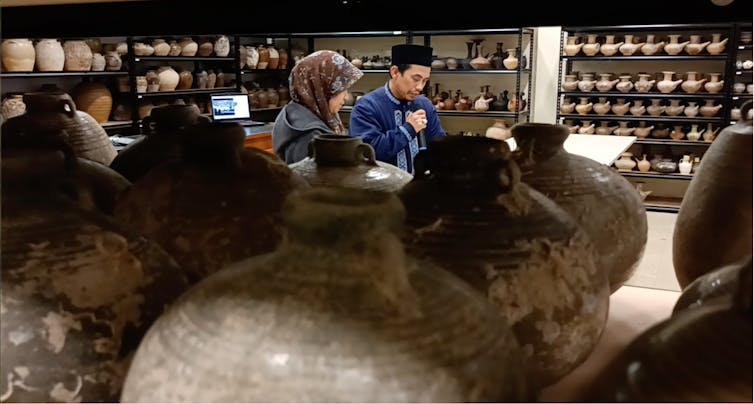 Ancient shipwrecks, sunken cargoes and the submerged past are underwater cultural heritage.Priyambudi Sulistiyanto
Ancient shipwrecks, sunken cargoes and the submerged past are underwater cultural heritage.Priyambudi Sulistiyanto![]()

